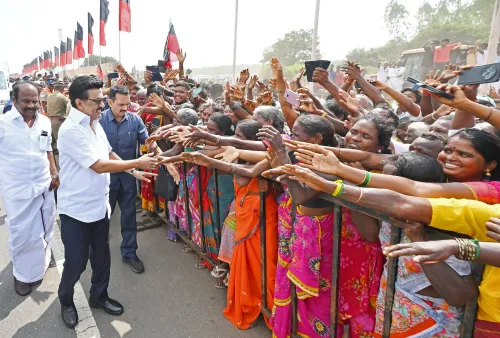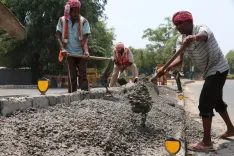How is Rajasthan Boosting Milk Production with Brazilian Gir Bull Semen?

Synopsis
Key Takeaways
- Rajasthan imports 2,680 doses of Brazilian Gir Bull semen.
- Initiative aims to boost milk production in 23 districts.
- Potential to increase yields to 40-50 litres daily.
- Part of the National Gokul Mission’s Breed Improvement Programme.
- Future plans include a laboratory for sex-sorted semen.
Jaipur, May 15 (NationPress) In an impressive step to enhance the dairy industry and increase milk production, the Rajasthan government has brought in 2,680 doses of purebred Gir Bull semen from Brazil for the purpose of artificial insemination of local cows across 23 districts in the state.
This initiative is a key part of the National Gokul Mission’s Breed Improvement Programme, aimed at improving the genetic potential and productivity of indigenous cattle.
Officials report that Brazilian Gir bulls, particularly from the Espetaculo FIV and IVA FIV D Brass breeds, are recognized for their exceptional milk-yielding capability, with their offspring able to produce 5 to 8 times the milk compared to native cows.
Rajasthan Minister Joraram Kumawat stated that the average milk production from indigenous cows in the state currently falls between 10 to 20 litres daily. "With this new approach, we anticipate yields could soar to 40-50 litres per day," he remarked.
Launched in April, the project has already allocated doses across various districts, including: Ajmer (830 doses), Jaipur (600 doses), Kota (400 doses), Udaipur (500 doses), Pali (150 doses), and Bharatpur (200 doses).
A request for an additional 10,000 doses has been made to the central government to address the increasing demand.
Cows are currently being shortlisted for artificial insemination in districts such as Ajmer, Bhilwara, Tonk, Udaipur, Chittorgarh, Dungarpur, Banswara, Pratapgarh, Jaipur, Sikar, Alwar, Dausa, Jhunjhunu, Kota, Bundi, Jhalawar, Baran, Pali, Bharatpur, Karauli, Sawai Madhopur, and Dholpur.
The 2019 livestock census revealed that Rajasthan is home to over 10.43 lakh Gir breed cows. “This programme signifies a crucial step towards enhancing the rural economy through improved dairy production,” Kumawat emphasized.
In a related effort, the state government has initiated a project to increase the number of female calves through artificial insemination utilizing sex-sorted semen.
Acquired from a laboratory in Chennai, the sex-sorted semen is projected to yield approximately 80-90 percent female calves. Out of the one lakh doses ordered, 60,000 have already been received, and distribution commenced on Thursday; the remaining 40,000 doses are anticipated by June.
The government also envisions expanding the programme in 2025-26 with a goal of conducting artificial insemination in 10 lakh animals.
Plans are in place to establish a dedicated laboratory for sex-sorted semen in Rajasthan to ensure a timely and effective supply within the state.
“This initiative will not only enhance milk production but also target the issue of increasing male calf numbers, which has long been a concern for livestock farmers,” Kumawat stated.










